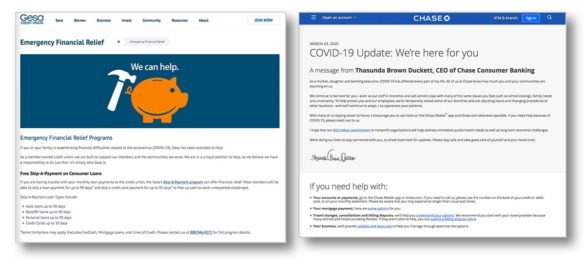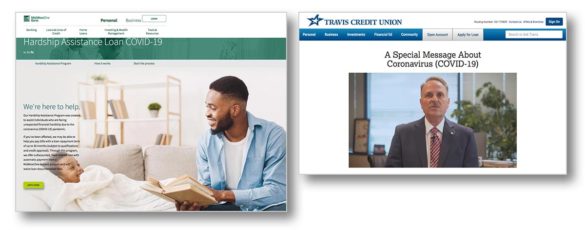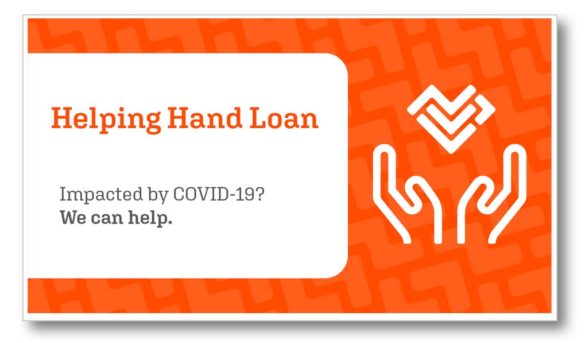As the economic impact of the COVID-19 pandemic continues to deepen and widen, a growing number of banks and credit unions have begun reaching out to consumers with relief measures for those whose livelihood has been affected by business closures, job loss or illness. These efforts range from disaster or hardship loans at low rates and lenient terms to “skip-a-pay” offers to waivers that are automatic or on request for deposit account charges, including overdraft fees.
Generally financial institutions have used websites and emails to provide detailed messaging about their efforts to address the effects of coronavirus, with social media typically driving consumers to sites with short advisories. The visibility of coronavirus messages varies from site to site, with some institutions devoting considerable home page space to general announcements and relevant graphics — hand washing has become emblematic — with links to more detailed pages. Other institutions have kept their pre-outbreak layouts, adding a top banner, a button, or a box pointing site visitors to their coronavirus pages. Some institutions, both large and small, have posted videos of leaders providing general comments or details about assistance efforts.
Frequently, credit unions have been publishing much more detail on the nature of relief they are offering to borrowers and depositors. With exceptions, banks often refer generally to willingness to discuss consumers’ credit worries on a case-by-case basis, urging people to get in touch with contact centers or dedicated product hotlines. Some institutions have posted summaries and links concerning their relief offerings on trade association sites. The American Bankers Association has established a page, and the Independent Community Bankers of America is gathering information about banks’ efforts. The Bank Policy Institute offers a page of links to large bank coronavirus pages. The Credit Union National Association offers overviews of what credit unions are offering.
Major institutions have announced multi-million-dollar commitments of aid for communities affected by COVID-19.
Many institutions have been working on this challenge, and sometimes a small but interesting detail can get lost. A few we spotted in visiting websites:
- Chesapeake Bank, in Virginia, has been including copies of relevant emails on its coronavirus page for consumers who may have missed them in the flood of COVID-related emails being sent by businesses.
- Travis Credit Union, in California, is offering disaster relief loans to members of up to $10,000 that can be applied for online. To obtain the special loans, they can use a “promo code” the credit union provides, reminiscent of an ecommerce special offer.
- Umpqua Bank, headquartered in Oregon, has been leveraging its “Go-To” bankers — personal bankers consumers select — to assist consumers who want a human voice that’s a step beyond a contact center.
- Arvest Bank, headquartered in Arkansas, has one of the strongest and most graphically appealing coronavirus pages we’ve come across. The page, too large to reproduce here, not only features clear blocks of copy concerning the bank’s efforts but also resources available from other private organizations, in addition to the usual government links.
- BECU, in Washington state, heavily hit by coronavirus, is offering members new loans of up to $2,500 at 0% for up to 24 months, with the option to defer the first payment for three months.

Industry Cloud for Banking from PwC
PwC’s Industry Cloud for Banking applies our deep industry knowledge to your specific business needs

How Banks Are Fortifying Their Data Against Increasing Cyber Threats
This webinar from Veeam will detail the value of working together across your organization to be better prepared in cyber defense and response readiness.
Read More about How Banks Are Fortifying Their Data Against Increasing Cyber Threats
Here and there our canvass of the web found institutions that even by late March 2020 make no obvious mention of the coronavirus issue. Under current circumstances, unless they’ve been blanketing consumers with email, that’s quizzical.
Regulators act to encourage institution efforts. It’s not unusual for regulators to issue advisories to lenders when natural disasters or major economic downturns hit a state or region, but the coronavirus is nearly unique. In late March 2020 federal banking and credit union regulators and state regulators issued an advisory encouraging institutions to work with consumer, business and mortgage borrowers affected by COVID-19. The document pledges that examiners will not criticize loan modifications made as a result of the disease’s impact. It also underscores that not all modifications are classified as troubled debt restructurings.
“Short-term modifications made on a good faith basis in response to COVID-19 to borrowers who were current prior to any relief are not TDRs,” an interagency announcement stated.
In later March, subsequent to the initial publication of this article, on March 26 regulators issued a statement encouraging banks and credit unions to offer “responsible small-dollar loans” to consumers and small businesses affected by the coronavirus crisis.
With broader impact, on March 27 President Trump signed the CARES Act — Coronavirus Aid, Relief, and Economic Security Act — which includes multiple aspects of interest to bank and credit union lenders. The Financial Brand has published a summary of the Act.
Meanwhile in late March 2020 Democrats in the Senate introduced legislation that would bar overdraft charges for the duration of the coronavirus crisis.
The following sections are general reviews of what each group of institutions has been offering and most link to the institutions’ specific coronavirus web pages. They were compiled from a variety of sources, chiefly directly from the institutions’ websites. This is a sampling of approaches, features and verbiage used by each of the institutions for our readers’ consideration and not an exhaustive list.
Coronavirus Aid Offered By Larger Banks
One of the first major financial institutions to get very specific detail out about its offerings was Ally Bank. Among them:
- Auto loans: Borrowers can defer payment for up to 120 days, with no late fees. Finance charges will accrue.
- Home loans: Deferral for 120 days, no late fees, but with finance charges accruing.
- Deposits: All fees related to expedited checks and debit cards, overdrafts and excessive transactions on savings accounts will be waived for 120 days.
Bank of America features a video of Holly O’Neill, Head of Consumer, Small Business & Wealth Management Client Care, concerning the institution’s willingness to discuss individual problems with loans and deposits.
Capital One has chiefly made a public promise, noting that some consumers will find themselves in difficulty. “Capital One is here to help, and we encourage customers who may be impacted or need assistance to reach out to discuss and find a solution for you.”
JPMorganChase has a dedicated coronavirus page but has kept its offerings general, referring consumers to various hotlines to discuss potential relief. A Chase spokesman told CNBC that it has been waiving fees and extending payment dates for cards, car loans and mortgages. Credit lines have also been increased on request.
Citibank has offered fee waivers on monthly service fees and waived CD penalties. The bank’s announcement noted that Citi already routinely offers assistance for troubled credit card customers.
KeyBank made a general announcement about potential relief and refers consumers to a page listing existing borrower relief measures.
Wells Fargo announced a series of steps, among them:
- Suspension of residential property foreclosures, evictions and involuntary auto repossession.
- Waiving fees, deferring payment and offering other assistance on auto and personal loans, mortgages and credit cards.
Read More:
- Banking Without Branches a Matter of Life and Death
- Work At Home Disruption Creates Once-In-A-Lifetime Opportunity
Coronavirus Aid Offered By Mid-Sized and Community Banks
Regional and community banks have been working on relief programs for their borrowers and depositors as well. Frequently this entails working out details not only in their own organizations but in cooperation with mortgage servicers and card companies.
At BBVA USA offerings include:
- Deferred and extension payments on existing consumer loans and credit cards.
- Waived and refunded ATM fees.
- Penalty-free withdrawals from CDs opened prior to March 1.
CIT Group announced that at its OneWestBank and CIT Bank, the company would waive fees for ATMs, overdrafts and early withdrawals on CDs. At its national direct bank, CIT said it was also waiving those fees and working to increase daily withdrawal limits. The company also offers Personal Finance Empowered digital learning modules.
City National Bank, in W. Virginia, has publicly pledged it will make no new repossessions and no new foreclosures through the end of March, possibly to be extended. Late fees on consumer loans and mortgages are suspended and payment deferrals are offered in both categories.
First Horizon‘s relief webpage promises in all-caps, “We’ve got your back.” The Tennessee bank offers clear tables showing what aid it is providing in key areas and offers multiple ways to request assistance, including an online form.
Fulton Bank, Pennsylvania, is offering waivers of late payment fees and credit reporting, temporarily. The bank is also waiving early withdrawal penalties. A Visa card is being offered with 0% interest for 20 months and an unsecured credit line is being offered with introductory 0% APR for three months and 4.00%-8.75% APR based on credit qualifications and other factors after the introductory rate ends.
M&T Bank, New York, is offering a new personal loan program featuring a special 2.99% APR on up to $5,000 to cover living expenses and other necessities. In an announcement the company noted that it has been offering payment deferrals and fee waivers as well.
MidWestOne Bank, in Iowa, has unveiled its Hardship Assistance Program. “If you’ve been affected, we may be able to help you pay bills with a loan repayment term of up to 36 months (subject to qualifications and credit approval). Through this program, we offer a discounted, fixed interest rate with automatic payment from a MidWestOne deposit account and will waive loan documentation fees.”
Ridgewood Savings Bank, in New York, is offering interest-free loans for up to a year and up to $10,000, to be secured by consumers’ deposits.
Umpqua is deferring loan payments for up to 90 days, waiving all fees associated with such deferrals for up to 90 days, and waiving ATM fees.
Volunteer Federal Savings, in Tennessee, has promised in an online ad, “We are always there for you.” The bank promises every effort to facilitate deferred or skipped payments, but has also introduced small dollar relief loans at 1% APR and no payments for 90 days.

Coronavirus Aid Offered By Credit Unions
While smaller banks tend to speak more of community ties than larger brands do, credit unions of all sizes find themselves very much in member support mode right now.
Bethpage Federal, New York — “We’re open and we’re here to help,” it says right on its home page in a COVID-19 message. The credit union provides an online form for requesting hardship loans as well as relief on existing loans.
Canvas Credit Union, Colo. — Among the Canvas offerings is its Helping Hand Loan program, which features a term of up to 36 months, no payments for 90 days, and a 3.99% APR. The loan is capped at up to one month’s net pay. The credit union is also featuring up to two months’ payment deferral on closed-end consumer loans, with the exception of mortgages.
Congressional Federal Credit Union, D.C., made a general announcement on relief: “We understand that there may be instances where members find themselves facing financial difficulties. Congressional Federal is here to help, and we encourage our members who may need assistance to reach out to discuss finding a solution.”
Of a handful of other federal government credit unions’ websites, some were completely silent on coronavirus issues or offered only branch-status updates and similar information. But the State Department Credit Union offered, among other measures, refunds of cash-advance fees for withdrawals from ATMs with credit cards.
First Entertainment Credit Union raised its ATM withdrawal limit, temporarily authorizing withdrawals of up to $1,000 daily from ATMs and waiving all ATM fees.
Gesa Credit Union, in Washington state, reminded members about its “Skip-A-Payment” program. In general members can skip loan payments for up to 90 days and also skip credit card payments for up to 30 days. Gesa is also offering low-rate and zero rate personal loans.
Golden 1 Credit Union, in California, is offering many fee and penalty waivers and offering loan payment deferrals on auto, home equity, personal loans, mortgages and credit cards and personal credit lines. It also promises no negative credit reporting. Golden 1 is also offering a member emergency loan program providing up to $5,000 at rates as low as zero.
O Bee Credit Union, in Washington state, is offering Emergency Support Loans as low as 3% APR. It will also waive the usual fee for Skip-A-Pay.
VyStar Credit Union, in Florida, is offering Emergency Relief Loans, featuring a zero interest period followed by a low-interest period. Other credit solutions being offered include expedited increases on lines of credit. CD early withdrawal penalties will also be waived.
Additions were made to this article on March 30, 2020.











